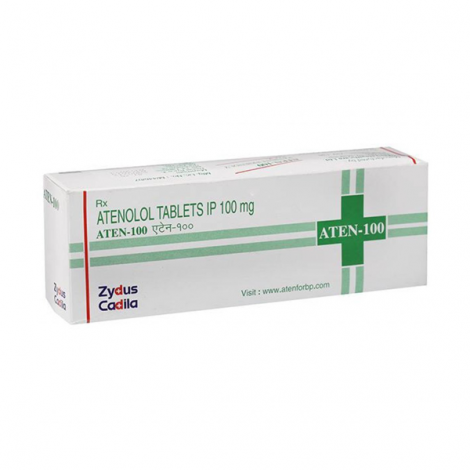Product Description
Aten 100 mg is a prescription medicine for patients with mild to moderate hypertension (high blood pressure). It is usually prescribed with other medicines, particularly a thiazide diuretic. However, it may be used alone as an initial agent in those in whom, in the doctor's judgment, treatment should begin with a beta blocker instead of a diuretic. Aten may also be used in combination with vasodilators to treat severe hypertension.
The medicine is not recommended for the emergency treatment of hypertensive crises. Doctors may also prescribe Aten tablets for the long-term management of patients with angina pectoris (chest pain) due to heart disease. It is not effective in treating a sudden attack of angina. Aten contains the active ingredient Atenolol, which belongs to a class of medications known as beta blockers.
The class of drugs works by affecting the body's response to certain nerve impulses, especially in the heart. As a result, these drugs decrease the heart's blood and oxygen requirement, reducing the heart's workload. Atenolol causes the relaxation of blood vessels in the body, thus lowering blood pressure. It also treats irregular heart rhythms and normalizes the heartbeat.
How To Use
Follow all directions given to you by your doctor; if you do not understand the instructions given on your prescription, please read them again. For hypertension, you may be advised to take the dose of Aten 100 mg once a day. If you may be advised to take two 100 mg tablets, take one of your Atenolol in the morning and the other in the evening. For angina pectoris or irregular heartbeat, the usual dose is 100 mg.
Certain people, such as the elderly or those with kidney disease, may need a lower dose. Whether you take this medicine before or after consuming food doesn't matter. Swallow the pill with a glass of water during or immediately after a meal. Continue to take the medicine until your doctor asks you to stop. It helps treat your condition but does not cure it.
Precautions
Patients with bronchospasm (muscles in your bronchi tighten and cause airways in your lungs to narrow), in general, do not receive beta blockers. There may be increased difficulty in treating allergic reactions in patients on Aten medicine. In these patients, the reaction may be more severe because of this medicine and problems with fluid changes. Atenolol should be administered with caution to diabetic patients who are receiving insulin or oral hyperglycaemic agents.
Side Effects
The most serious side effects encountered are congestive heart failure and bronchospasm. Bronchospasm usually affects people with bronchial asthma or a history of asthmatic complaints. The most common side effects reported in clinical trials with oral Aten are dizziness, fatigue, vertigo, nausea, and diarrhoea. Some rarely reported side effects include chest pain, left pain, palpitations, heart block, oedema, cough dyspnoea, drowsiness, tiredness, insomnia, headache, and paraesthesia.


